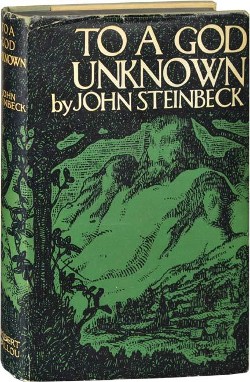Plot
The protagonist of this story is Joseph Wayne, a rancher who was born and lived his early life on his father's ranch. He is the third of his brothers, younger than Burton and Thomas, who are both already married, but older than Benjy. As he grows up, he feels a special connection to the land, and decides to move to California to create a homestead and start a family. His father, John Wayne, begs him not to go but finally acquiesces once he realizes Joseph's passion, and gives him his blessing. On his way west, Joseph meets "Old Juan" who encourages him to establish a home and throw a fiesta once his home is set up. After a time of wandering, Joseph enters California and records his homestead in the Nuestra Senora valley. He builds his house under a great oak tree, which comes to symbolize his deceased father. While building, he works with an Indian, Juanito, who offers to be his vaquero in exchange for friendship. Joseph hears about the "dry years", a lengthy drought that seems to be periodic, and is the bane of all the farmers in the area. He is convinced, however, that they will never come again. He writes to his brothers and tells them to come and join him, to take the land next to his. As they explore the land they have been given, Joseph and Juanito stumble upon a mossy rock and a deep spring in the center of a pine forest. It has an aura about it that makes everyone acknowledge that it is sacred, but it is frightening as well.
Joseph later meets Elizabeth, a schoolteacher from Monterey. After several failed attempts, Joseph wins her hand and they are married. When they return to the farm after the wedding, they discover that Benjy has been stabbed to death by Juanito, who caught him seducing his wife. When the two men meet later that night at the sacred rock, Juanito asks Joseph to kill him in revenge for his brother, but Joseph refuses. Joseph wants to pass it off as an accident so Juanito can stay on, but Juanito flees the farm, promising to return once the guilt has passed. Elizabeth is integrated into the farm and meets Rama, Thomas' wife, who helps her with many things, including her first childbirth. For a time, the farm prospers, and Elizabeth bears a child. Joseph's brother Burton, a devout Christian, becomes increasingly concerned with Joseph's activities with the tree, after seeing him talk to it and apparently offer sacrifice to it as well. After a time, Joseph remembers his promise to Old Juan, and the farm becomes the site of a New Year's fiesta. After witnessing all the pagan activities that take place at the fiesta, Burton decides to leave the farm. After he leaves, the remaining brothers discover Burton had girdled the tree to kill it. In the following rainless winter, everything begins to die as a severe drought sets in, and everyone fears that the dry years have come again.
One day, Joseph and Elizabeth visit the glade with the sacred rock, to quell Elizabeth's fear of it. Elizabeth decides to climb on the mossy rock, but slips and falls, breaks her neck, and dies instantly. Joseph returns to the homestead in a state of shock with Elizabeth's body. Rama sees how disturbed Joseph is and sleeps with him to fulfill their needs. Later in the novel, Joseph gives his firstborn son to her. Some time later, when the drought is forcing desperate measures, Joseph and Thomas explore the coast to see if there is any way they will be able to remain at the homestead. They meet a man who ritually sacrifices small creatures to the sunset each evening, and Joseph feels a connection to him. Upon returning, Joseph and Thomas decide to drive the cattle out to San Joaquin to find green pastures. At the last minute, Joseph elects to stay, but feels abandoned by all the land except the pine grove with the stream and the mossy rock. He believes that the mossy rock is the heart of the land, and as long as it stays alive, the land cannot be truly dead. He then lives by the rock and watches the spring slowly dry up, using the water to keep the rock wet and alive. Juanito returns and convinces Joseph to visit the town's priest to enlist his help in breaking the drought. The priest initially refuses to pray for rain, saying that his concern is the salvation of human souls, but secretly prays for it once Joseph departs. Defeatedly, Joseph returns to the rock, only to find that the stream has run dry and the rock is dying. Lost in confusion, Joseph realizes that he is the heart of the land, and so sacrifices himself by cutting his wrists to water the rock with his blood. As he lies dying on the sacred rock, he feels rain begin to fall again. [3]
